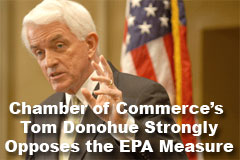The climate change and CO2 emissions landscape took another turn today, as the US Environmental Protection Agency (EPA) announced it was now going to consider greenhouse gases (largely CO2) as a danger to public health and welfare, giving it broad powers to regulate those emissions across businesses and individuals.
The move, coming as world leaders go to the UN climate summit in Denmark, could allow the EPA to place onerous rules and costs on business without a global treaty among nations or a cap and trade-type law in the US.
Under US law, such an "endangerment finding" can allow the EPA to enact new emission standards for cars, thought to be a likely first action, which could be followed by new rules on business, especially large CO2 emitters such as utilities and manufacturing plants.
"These long overdue findings cement 2009s place in history as the year when the U.S. government began addressing the challenge of greenhouse-gas pollution and seizing the opportunity of clean-energy reform," EPA Administrator Lisa Jackson said in a statement.
Much More Powerful than Cap and Trade
With the prospects for passage of a cap-and-trade bill in the US Senate dicey at best, and uncertainty as to whether any agreement at all will come out of the UN meeting, the EPA move may be the fastest – and most effective and feared – way for the US to reduce CO2 emissions.
Indeed, while US business interests have generally opposed cap-and-trade legislation, many business-friendly observers have not worried greatly over the potential impact. Cap-and-trade laws have largely been ineffective in Europe, for example, with little negative repercussions, in practice, after their enactment. Politicians such as German chancellor Angela Merkel have said publicly that they will not allow climate regulations to put their home businesses at any form of competitive disadvantage versus those in other countries – in practice, meaning the regulations have not really had many teeth.
A regulatory approach from the EPA, however, could be an entirely different matter. In effect, the move paves the way for the Obama administration to act on carbon emissions without Congressional support.
In April, the EPA started taking public comments about global warming, a sign that the agency was moving to a view that greenhouse gases pose a health threat. It has not stated, however, what diseases or illnesses it is associating with greenhouse gas emissions.
The EPA's finding "could result in a top-down, command-and-control regime that will choke off growth by adding new mandates to virtually every major construction and renovation project," U.S. Chamber of Commerce President Thomas Donohue said earlier in a statement. "The devil will be in the details, and we look forward to working with the government to ensure we don't stifle our economic recovery.”
 EPA action won't do much to combat climate change, and "is certain to come at a huge cost to the economy," said the National Association of Manufacturers to the news. EPA action won't do much to combat climate change, and "is certain to come at a huge cost to the economy," said the National Association of Manufacturers to the news.
The Iron and Steel Institute said that successful climate policy must "reduce emissions without altering the competitiveness of American steelmakers."
Even Michigan Congressman John Dingell, who supports cap-and-trade legislation, came out strongly against the EPA move: “We are looking at the possibility of a glorious mess being visited upon this country. This is not what was intended by the Congress and by those of us who wrote the Clean Air Act. We are beginning to look at a wonderfully complex world, which has the potential for shutting down or slowing down virtually all industry and all economic activity and growth,” Dingell said.
The timing of the announcement was likely not coincidental. The EPA move comes with President Obama heading to the Denmark UN meeting, and gives him something to show other world leaders who criticize him two weeks ago when the US announced it was unlikely to approve a binding agreement in Copenhagen (see No Binding CO2 Treaty will Come out of Copenhagen Summit ).
The endangerment finding will let the EPA Federal Clean Air Act regulate carbon-dioxide emissions, and mandate costly new equipment to reduce those emissions. The EPA is saying it will do so only for very large emitters, but business groups could challenge that discrimination in court.
What is your reaction to the EPA move? A smart way to gain control over CO2 – or dangerous approach that bypasses lawmakers? Let us know your thoughts at the Feedback button below.

TheGreenSupplyChain.com is now Twittering! Follow us at www.twitter.com/greenscm
|